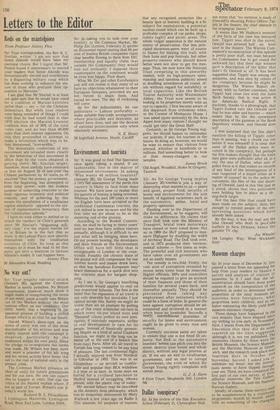Environment and tourists
Sir: It was good to find The Spectator once again taking a sound, if unfashionable, line in the matter of threatened environment. In asking 'Who wants 40 million tourists?' (January 26), Sir George Young made a very fair assessment of the perils this country is likely to face from mass tourism. We have now to realise that the pattern of history is being reversed. Whereas for the past 100 years or more the English have been accepted as the traditional Continental tourists, the rich milord is now no more and for the first time we are about to be at the receiving end of 'the process. According to the Roskill Commission, we shall be facing in thirty years' time no less than forty million visitors annually, although it is difficult to see just what will be bringing them here. On our present howing, the developers and their friends at the Environment Office will have left little that is recotgnisable of London or the countryside. Possibly the chronic state of the pound will still compensate for our inferior hotels and insane drink laws, so that less fastidious Europeans may brace themselves for a quick dive into the concrete slum for bargain shopping.
As I see it, Sir George's horrifying predictions would appear to rest on two important fallacies. The first is the belief that the expansion of air travel is not only desirable but inevitable. I just cannot accept this. Surely we might do worse than set an example by pulling out of this crazy aviational rat-race in which every tin-pot island state and 'liberated' colony prefers its own prestigious, if ruinously expensive, airline to real development Or care for its people. Instead of frantically promoting Maplin as a kind of aerial Clapham Junction, we might in the long run be better off at the end of a branch line from (say) Paris. After all, air travel in Europe has long ceased to be any kind of pleasure. The last continental flight I actually enjoyed was from Northolt to Gibraltar in 1953. This was in an Elizabethan — an aircraft so comfortable and popular that BEA withdrew it a year or so later. In those days we halted for a civilised luncheon in Madrid instead of struggling, elbows pinned, with the plastic tray of today.
My second fallacy may be described as the Amenity Area philosophy, which was so eloquently denounced by Mary Warnock a few years ago on Radio 3. This assumes, for purposes of tourism, that any recognised attraction like a beauty spot or historic building is a fit subject for exploitation, a potential nucleus round which can be built up a profitable complex of car parks, shops, toilets (ugh!) and picnic areas. The whole vulgar apparatus is the natural enemy of preservation. Our less principled showmen-peers were of course to blame for blazing this trail, with their lions and pop festivals, but other property-owners who should know better were not slow to get the message. Thus, we now have the National Trust competing in this unworthy market, with its high-pressure salesmanship and tasteless publicity aimed at doubling attendances all round, often without regard for suitability or local capacities. Like the British Tourist Authority with Westminster Abbey, the Trust now seems to be looking at its properties merely with an 'eye to capacity. I first became aware of this departure from orthodoxy when, as the Curator of Montacute House, I was asked (quite seriously) by the Area Agent how many visitors I thought we could 'get into' the Great Hall!
Certainly, as Sir George Young suggests, we should hasten to rationalise our policies, if any, for tourism in the future. In doing so, however, we would be wise to ensure that visitors from abroad, whether in hundreds or in millions, find something better to look at than money-changers in our temples.
James Brock Old Angel, Woodhill, Stoke St Gregory, Taunton
Sir: As Sir George Young implies (January 26),tourismis just a way of destroying what matters to us — peace and quiet, proper food, security of home and environment for the sole benefit of legalised racketeers such as the automotive, airline, hotel and property operators.
Handing over to the Department of the Environment, as he suggests, will make no difference. He claims that since DoE took over the Ministry of Transport, brutal town motorways have ceased or been toned down. Not so: in 1969 the MoT proposed to massacre Highgate by doubling the width of Archway Road. The DoE took over, and in 1973 produced their 'environmental' scheme — five times as wide. , The powerful and rich interests who have taken over all government are not so easily beaten.
The remedy is two-fold. Firstly, the vast sore of corruption revealed by recent news items must be removed. Higher officials, MPs and councillors should be required to give an account of their finances and those of their families for several years back, and thereafter annually. They should be prevented from taking any employment after retirement which could be a form of bribe. In general the laws against corruption should be administered and reviewed in a manner which leave no loopholes. Secondly a nearly unconditional guarantee of security for home and environment ought to be given to every man and woman.
Currently immense pains are taken to ensure that one is not fined £5 unjustly, but DoE at the automotive interests' behest can pitch you into the street, destroy your house and whole district, without any legal process at 'all. If we see an end to totalitarian government, and an end to corrupt government, the evils of which Sir George Young rightly complains will wither away.
G. J. A. Stern
6 Eton Court, Shepherds Hill, London N6


































 Previous page
Previous page